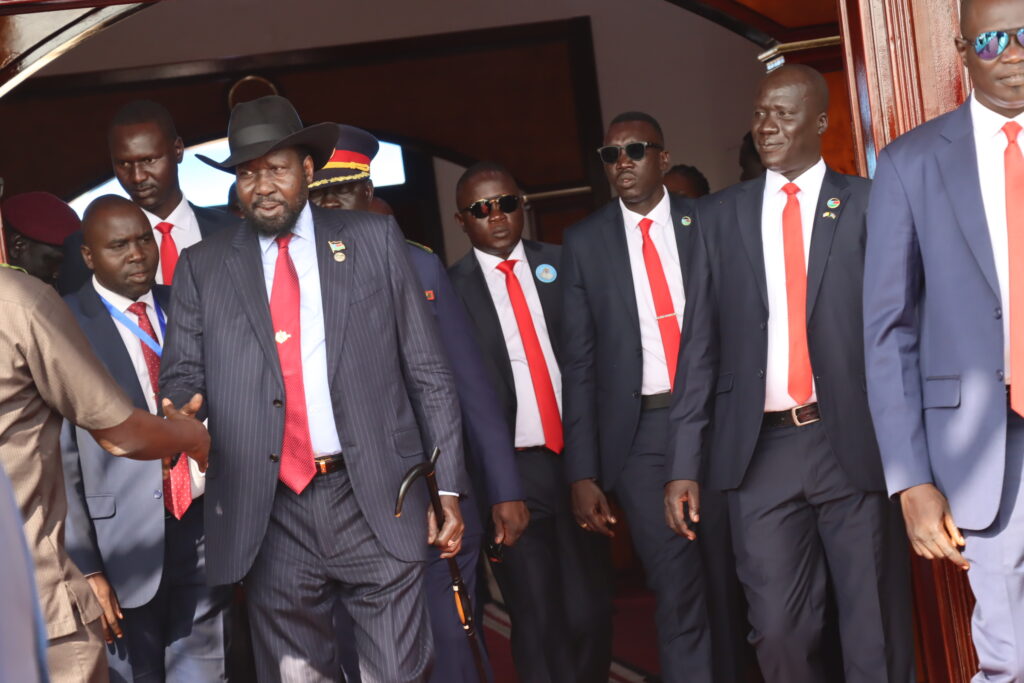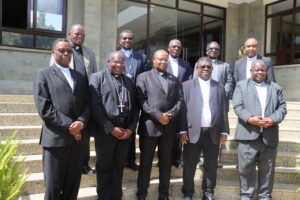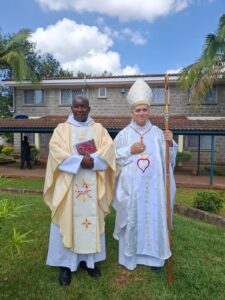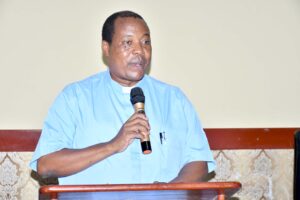PAPAL VISIT SOUTH SUDAN: No peace without justice, no justice without freedom; Pope Francis.

South Sudan President Salva Kiir Mayardit Arrive to receive Pope Francis at Juba International Airport
Sarah Pelaji
Pope Francis has directed his call to South Sudan’s belligerent political leaders saying that they are called to renew the life of society as pure sources of prosperity and peace, so greatly needed for the sons and daughters of South Sudan.
He insisted on this during his ecumenical pilgrim of peace in South Sudan when he addressed the nation’s authorities, civil society and diplomatic corps at the Presidential Palace of Juba on 3 February 2023 shortly after his arrival.
His Holiness reminded them that he has come “as a pilgrim of reconciliation, in the hope of accompanying them on their journey of peace.
“They need fathers, not overlords; they need steady steps towards development, not constant collapses.
May the time that followed the birth of the country, its painful childhood, lead to a peaceful maturity,” he said.
Speaking on democracy, Pope Francis reminded them on their day South Sudanese people was called Republic on 9 July 2011.
That to be a Republic means seeing themselves as truly public of the people. It declares that the state belongs to everyone and consequently those entrusted with greater responsibilities, presiding over and governing it, have the duty to place themselves at the service of the common good.
That is the purpose of power: to serve the community.
Yet there is always a temptation to use power for our own advantage. So, it is not enough simply to be called a Republic; it is necessary to be one, starting with the primary goods.
“The abundant resources with which God has blessed this land should not be restricted to a few, but recognized as the legacy of all, and plans for economic recovery should coincide with proposals for an equitable distribution of wealth,” he said.
He also reminded them that, the growth of democracy is essential to the life of a Republic.
It preserves the healthy distinction of powers in such a way that, for example, those who administer justice can do so without interference from those who legislate or govern.
In addition, democracy presupposes respect for human rights, upheld by law and the application of law, particularly the right to the freedom of self-expression.
“It should be kept in mind that there is no peace without justice (cf. SAINT JOHN PAUL II, Message for the Celebration of the World Day of Peace, 1 January 2002), but also that there is no justice without freedom.
Every citizen, therefore, should be enabled to make the most of the unique and unrepeatable gift of his or her life, and be provided with suitable means of doing so. In the words of Pope John XXIII:
“Every human being has the right to life, to bodily integrity and to the means necessary for the proper development of life,” he said.
He said that, South Sudan is the land which abounds in so many riches, in its soil but above all in the hearts and minds of its people, needs to be watered anew by fresh and life-giving springs.
“Dear authorities, those “sons and daughters”, and history itself, will remember you if you work for the benefit of this people that you have been called to serve. Future generations will either venerate your names or cancel their memory, based on what you now do. For just as the Nile leaves its sources to begin its course, so the course of history will leave behind the enemies of peace and bring renown to those who are true peacemakers,” he insisted.
He wanted all authorities in South Sudan to make their country a more luxuriant garden not a cemetery.
“I beg you, with all my heart, to accept four simple words: not my words, but those of Christ, ‘No more of this.’ No more bloodshed, no more conflicts, no more violence and mutual recriminations about who is responsible for it, no more leaving your people athirst for peace. No more destruction: it is time to build! Leave the time of war behind and let a time of peace dawn.”
Dear President and Vice-Presidents, in the name of God, of the God to whom we prayed together in Rome, of the God who is gentle and humble in heart, the God in whom so many people of this beloved country believe, now is the time to say “No more of this,” Pope insisted.
He called for action against corruption noting that the inequitable distribution of funds, secret schemes to get rich, patronage deals, lack of transparency.
That, there is a need to combat poverty, which serves as the fertile soil in which hatred, divisions and violence take root.
“A civilized country is to care for its citizens, especially the most vulnerable and the disadvantaged.
“How many people have had to flee their homes, and now find themselves consigned to the margins of life as a result of conflicts and forced displacement!”
He called for the development of suitable healthcare policies, the need for vital infrastructures and the promotion of literacy and education.
“The only way that the children of this land will be able take their future into their own hands.
All the children of this country and of the world, they have the right to grow up holding in their hands notebooks and toys, not weapons and tools for labour,” he insisted.


